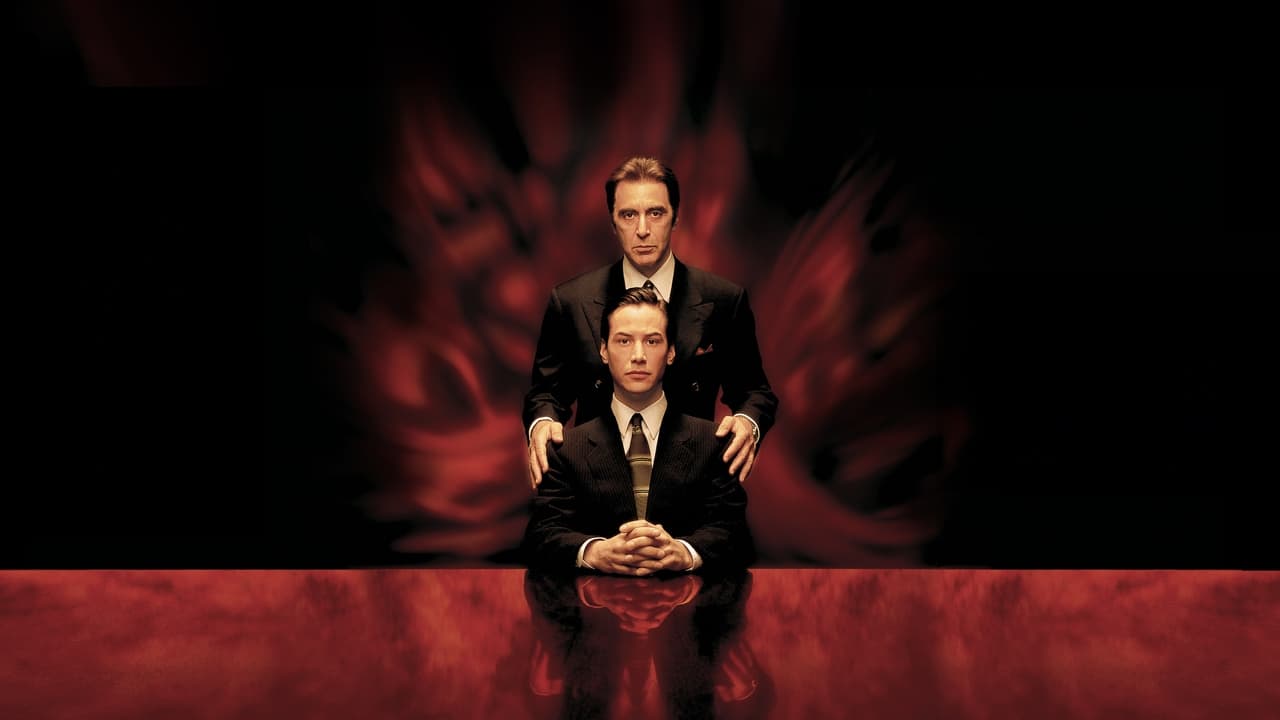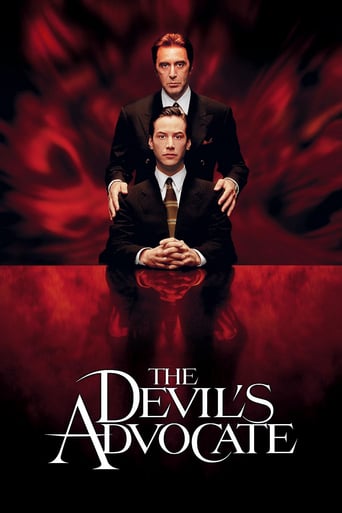ManiakJiggy
This is How Movies Should Be Made
Lumsdal
Good , But It Is Overrated By Some
Sanjeev Waters
A movie that not only functions as a solid scarefest but a razor-sharp satire.
Jemima
It's a movie as timely as it is provocative and amazingly, for much of its running time, it is weirdly funny.
Sager
Let's find out how devil and being an attorney are linked. Story: attorney ending up to work for the devil!!! It's interesting to see how the plot started and twisted. The characters are very well written. The conflict between a hard job and family, being ambitious and dedicated to your goals and personal life. Talented Al Pacino weaving a trap to Reeves in order to take a certain decision in combination to the concept of free will. Of course, Theron's role as the attorney's wife was fascinating.Acting: Wonderful Al Pacino, very good Theron, adequate Reeves.Recommended!!!
adamsfamilyfan
Devil advocate against whom?" god, the absentee land lord. Newsflash Sophia created the world Christ and dark-lord and successfully cloned herself.Asherah spew yahweh from her deep. She is first sex, scorpions and sharks reproduce asexually to produce an all female race.Isis could create a daughter or son, but made Horus with Osiris. Marianne was most high deity who came to earth to rule and bear yashua. not a rewarded mortal woman as catholics have it. Woman always conceives by her agency( all blocks, lif force pulls in sperm and linng duplicate cell, builds fetus. so its better to say with no male involved. No god, alien or human, so why worship a god over the emasculate conception? god , the landlord is the Devil's lie....god the pope the butler was true in myth and in real life male is second sex.Devil as a lawyer, is worth watching. " excuse me miss , did I leave my boots under your bed, your weakness is that they see your coming" Great timeless example like Elijah or beautiful witch who ask for help in disquise. Still a serious example of life style. Display of wealth for prestige versus living well. " vanity my favorite sin""all she wanted was love" Again a great narrative about priorities and unhealthy self obsession.She no doubt benefited from his success and wanted to be with her husband, but where is the line between support, Tagalog and left behind?
manosnb
I always remembered seeing the TV advertisements of the movie as a kid back in 1997 but I never actually sat to watch it until yesterday. Nice and interesting plot, top- notch actors performing well and a stunning Charlize Theron. However there were two things that were amazing in this movie and made me give it an 8 and not a 7. First the first totally unexpected jump scare scene in the dressing room. Even if you had the slightest idea about Al Pacino's true identity there was no way you were expecting this scare and that made it so unique and thrilling. The second thing was the ending. I do not always like ambiguous endings, especially when they are cheap and with no purpose, but the message of this one was truly thought-provoking. Vanity, oh vanity..
lindsay
Self-reflexivity in artistic works serves to remind the audience that they are viewing a cultural product. It prevents their becoming so involved in the text that they do not think critically about the message. The presence of the mirror during various scenes of The Devil's Advocate serves as a self-reflexive device to highlight the major themes of the film, namely duality, free will and truth. These important mirror scenes propel the plot action to Kevin's ultimate downfall and rebirth.The mirror first appears during the Gettys trial when Kevin is faced with a crossroads. He faces his reflection, and negotiates with himself in the mirror. The duality of seeing both him and his reflection highlights a struggle between good and evil. While Kevin sells his soul (ethic and morals) and makes his pact to keep his record clean, he does not wear his wedding ring. This recalls previous texts in which marriage is an institution frowned upon by the Devil. The sinking sound of the toilet flush and thunder with the rip of the paper towel further emphasize this crossroads scene. His decision to defend Gettys despite his knowledge highlights his pride. He is unwilling to lose a case and mar his unblemished record. The mirror sequence underscores his decision which propels the action forward, whereby Milton takes notice of him and lures him to New York.When Kevin meets Milton, the two are reflected in a man-made lake on the rooftop. The body of water often symbolizes the unconscious and deep, submerged truths. This scene foreshadows the final climax when Milton reveals that he is Kevin's father and that he values man-kind above all else. At this mirror/reflection scene Milton asks "you don't really want to go back to Florida, do you?" and Kevin decides he does not. This decision, emphasized by the mirror, propels the action again by allowing Mary Anne and Kevin to move to New York despite his mother's warnings. This is another crossroads, a time when he could have resisted his egotism.For Mary Anne, the mirror does not emphasize a crossroads, but truth. Milton looks at her over her shoulder at Eddie Barzoon's party, and the two are reflected in the mirror. It shows Mary Anne's desire to have someone standing there next to her. She is very lonely, and this scene is intercut with the first instance of Kevin bailing on her. He puts his work before her, leaving her alone.While in the dressing room with her new friends, one woman admits she had a boob job while another worries about her hips. The two women stand in front of mirrors admiring themselves, but Mary Anne sees the true self and not the reflection. These self-absorbed women, spending money and drinking, are monsters. She sees one morph into a hideous creature, while the mirror in front of her emphasizes the deception of appearances. It is Mary Anne who realizes first why she is being punished. She values the money and the apartment too much. She was taken in by the appearance, but the reality is far different. The mirror emphasizes the duality.At the hospital, Mary Anne refuses to look in the mirror because she thinks she will see a monster. She accepted blood money through Kevin's acquittals since she knew all those people were guilty. This emphasizes the mirror's ability to reveal true identity that later manifests with Pam. Evil had followed Mary Anne into her room in disguise, but the reflection revealed her true form. Mary Anne crashes the mirror at exactly the climax of Kevin's mother's story. Kevin had been running away and not listening to her, but after the incident he allows his mother to reveal that Milton is his father. The two scenes intercut emphasize the mirror as a teller of truth and discovering one's true identity. It is significant that Mary Anne kills herself with the mirror, because the truth hurts.Another mirror scene occurs while Kevin and Milton are at the boxing match. While on the phone with Mary Anne, Kevin spies a woman wearing a red dress in front of a mirror. As he's looking, he tells Mary Anne not to wait up, that he does not know when he will be home. This decision that he makes, in light of the fact that Milton is his boss and pays for their apartment and bills, is intercut with Mary Anne's dream that her ovaries are removed. Kevin's decision propels the action by leading to her first hysterical moment when he will take her to a doctor. The woman in red symbolizes evil, and she is alone. Perhaps it suggests the isolation of Mary Anne on the other side of the phone to whom he is speaking while looking at another. The woman reflects on the blood color of her dress that Maryanne will soon see. The reflection foreshadows the reality.In the final mirror scene, Milton dies and returns Kevin to the Gettys trial, in front of the mirror where it began. Kevin squints looking at his face, searching himself. His decision to kill himself propels the plot further and brings him back to himself. The cyclical nature of identity is further emphasized when Kevin abandons the trial, but relents to an interview when Larry calls him a star. Milton repeats that vanity is his favorite sin.These various mirror scenes emphasize key themes in the film. Because the mirror scene in the Gettys case frames the film, it is obvious that there are two paths to take. History will repeat itself in a different way the next time around, but there is no escape from the self. Kevin faces himself and makes a decision to support the case, and the second time to drop it. Mary Anne makes a decision to kill herself. Their decisions embody the philosophy of free will, and have very real consequences propelling the story forward.

